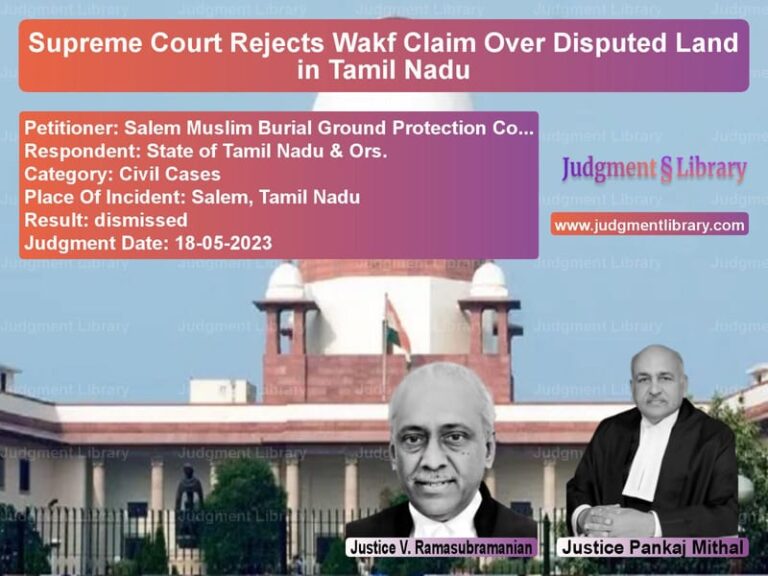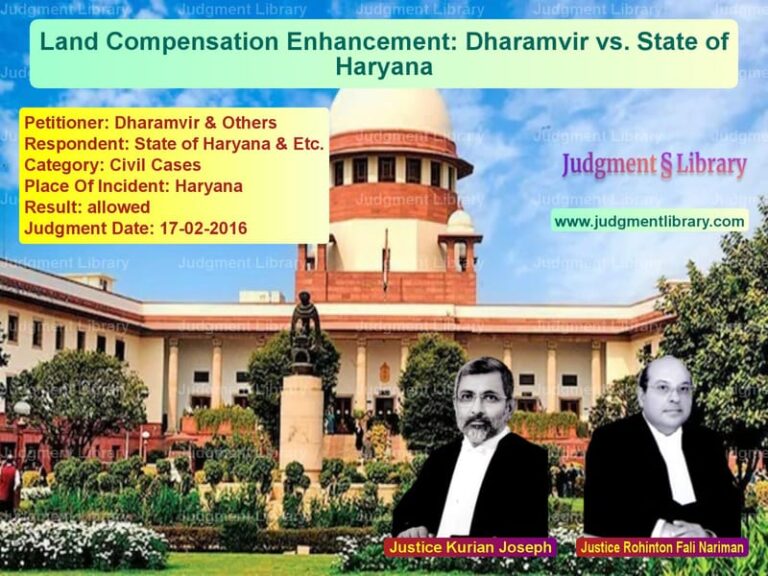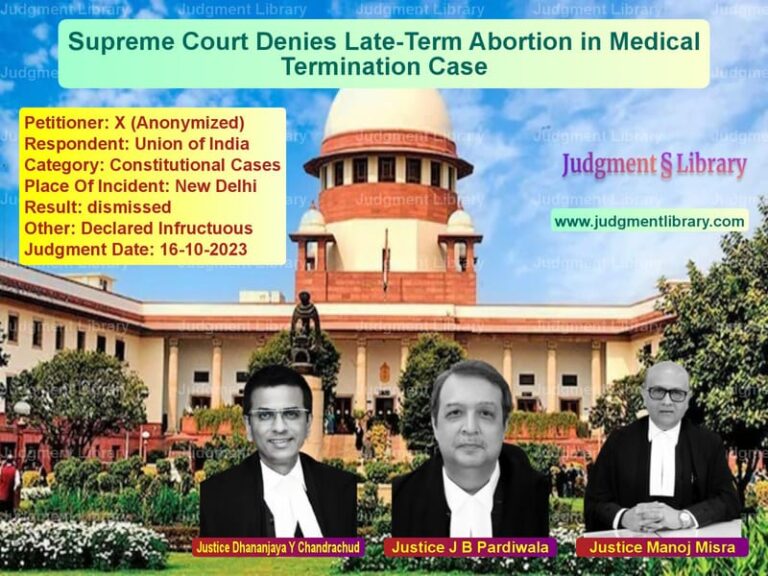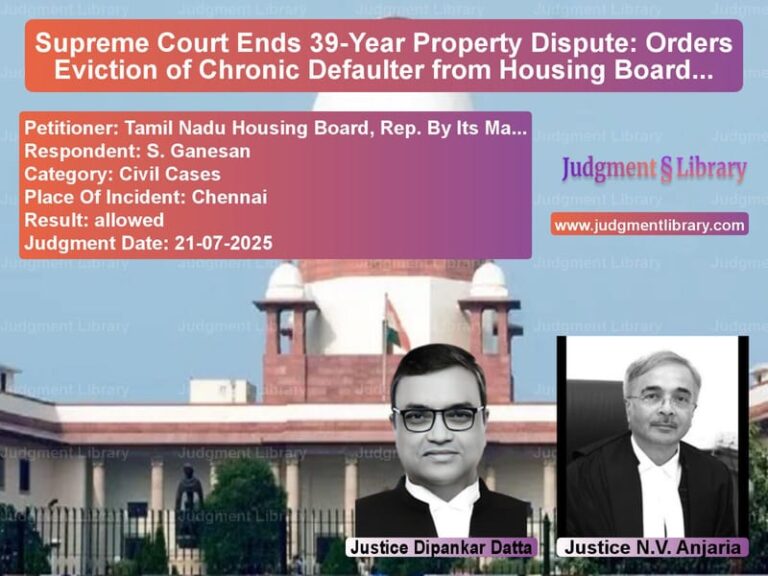Supreme Court Dismisses Review Petition in Madhya Pradesh Murder Case
The Supreme Court of India, on August 30, 2022, delivered a crucial judgment in the case of Rakesh @ Bhura Rajak vs. State of Madhya Pradesh. This case revolved around the conviction of the petitioner under Section 302 read with Section 34 of the Indian Penal Code (IPC) for murder. The petitioner had sought a review of the Supreme Court’s earlier dismissal of his Special Leave Petition (SLP), challenging his conviction. The Court dismissed the review petition, affirming that there was no apparent error on record to justify reconsideration.
This ruling is significant as it reinforces the principle that review petitions should not be used as a second appeal and must demonstrate a clear and apparent error in the earlier judgment for reconsideration.
Background of the Case
The case originated from an incident that took place in Madhya Pradesh, leading to the conviction of the petitioner under Section 302 read with Section 34 IPC. The petitioner, along with other co-accused, was found guilty of murder and sentenced to life imprisonment by the Sessions Court. The conviction was upheld by the Madhya Pradesh High Court upon appeal. The petitioner then filed a Special Leave Petition (SLP) before the Supreme Court, challenging the findings of the lower courts.
Read also: https://judgmentlibrary.com/supreme-court-declares-petitions-infructuous-in-gujarat-riot-cases/
The Supreme Court, after reviewing the matter, found no reason to interfere with the concurrent findings of the lower courts and dismissed the SLP.
Filing of Review Petition
Following the dismissal of the SLP, the petitioner filed a review petition, arguing:
- There was an error apparent on record in the earlier decision.
- The lower courts had misappreciated the evidence, leading to a wrongful conviction.
- The Supreme Court had failed to consider material aspects of the case while dismissing the SLP.
- The conviction was primarily based on circumstantial evidence, which was not sufficient to hold the petitioner guilty beyond a reasonable doubt.
Arguments Presented Before the Supreme Court
Appellant’s (Rakesh @ Bhura Rajak) Arguments
The petitioner’s counsel contended:
- The prosecution case was based entirely on circumstantial evidence and lacked direct eyewitness testimony.
- The evidence presented by the prosecution failed to establish an unbroken chain linking the petitioner to the crime.
- The petitioner had no prior criminal record and had been convicted solely based on conjectures.
- The Supreme Court should review its earlier decision as the petitioner’s fundamental rights were violated due to an unfair trial.
Respondent’s (State of Madhya Pradesh) Arguments
The prosecution, representing the State, countered:
- The conviction was based on strong circumstantial evidence and corroborative witness testimonies.
- The petitioner’s role in the crime was established beyond a reasonable doubt by the lower courts.
- There was no procedural irregularity in the trial, and the defense was given full opportunity to present its case.
- The review petition was merely an attempt to re-argue the case, which is not permissible under Article 137 of the Constitution.
Supreme Court’s Observations
1. Limited Scope of Review Petitions
The Court emphasized that a review petition should not be treated as an appeal:
“The power of review is not intended to provide a second opportunity to argue the case. A review is maintainable only if there is an apparent error on the face of the record.”
2. No Apparent Error on Record
The Court held that the grounds raised in the review petition did not demonstrate any apparent error:
“The grounds taken in the review petition do not make out any error apparent on record to justify interference.”
3. Finality of Criminal Convictions
The ruling reaffirmed the principle that once a case has been decided on its merits, it cannot be reopened through a review petition unless there is a glaring mistake:
“The concurrent findings of the Trial Court and the High Court, which were upheld by this Court while dismissing the Special Leave Petition, do not warrant reconsideration.”
4. Circumstantial Evidence as Basis for Conviction
The Court acknowledged that circumstantial evidence can form the basis of a conviction if it meets the legal standard:
“A conviction based on circumstantial evidence can be sustained if the evidence forms a complete chain pointing towards the guilt of the accused.”
Final Judgment
The Supreme Court dismissed the review petition, stating:
“The review petition is, therefore, dismissed. There shall be no order as to costs.”
The Court further directed:
- The petitioner shall continue serving the sentence as awarded by the lower courts.
- No further petitions shall be entertained on the same grounds.
Impact of the Judgment
The ruling has important implications:
- Reinforces the limited scope of review petitions: The judgment clarifies that review petitions cannot be used to re-argue a case.
- Upholds finality in criminal convictions: Once the Supreme Court has decided on a matter, review petitions must meet a high threshold to warrant reconsideration.
- Prevents misuse of judicial review: The decision discourages frivolous review petitions aimed at delaying execution of sentences.
- Strengthens reliance on circumstantial evidence: The judgment reinforces that circumstantial evidence, if strong enough, can lead to conviction.
Conclusion
The Supreme Court’s decision in Rakesh @ Bhura Rajak vs. State of Madhya Pradesh reinforces the principle that review petitions cannot be used to reopen settled matters unless there is a clear and apparent error. By dismissing the petition, the Court has reaffirmed the strength of judicial finality in criminal cases and ensured that justice is not unduly delayed by repeated challenges.
Petitioner Name: Rakesh @ Bhura Rajak.Respondent Name: State of Madhya Pradesh.Judgment By: Justice Uday Umesh Lalit, Justice Ajay Rastogi.Place Of Incident: Madhya Pradesh.Judgment Date: 29-08-2022.
Don’t miss out on the full details! Download the complete judgment in PDF format below and gain valuable insights instantly!
Download Judgment: rakesh-@-bhura-rajak-vs-state-of-madhya-prad-supreme-court-of-india-judgment-dated-29-08-2022.pdf
Directly Download Judgment: Directly download this Judgment
See all petitions in Murder Cases
See all petitions in Bail and Anticipatory Bail
See all petitions in Custodial Deaths and Police Misconduct
See all petitions in Judgment by Uday Umesh Lalit
See all petitions in Judgment by Ajay Rastogi
See all petitions in dismissed
See all petitions in supreme court of India judgments August 2022
See all petitions in 2022 judgments
See all posts in Criminal Cases Category
See all allowed petitions in Criminal Cases Category
See all Dismissed petitions in Criminal Cases Category
See all partially allowed petitions in Criminal Cases Category







